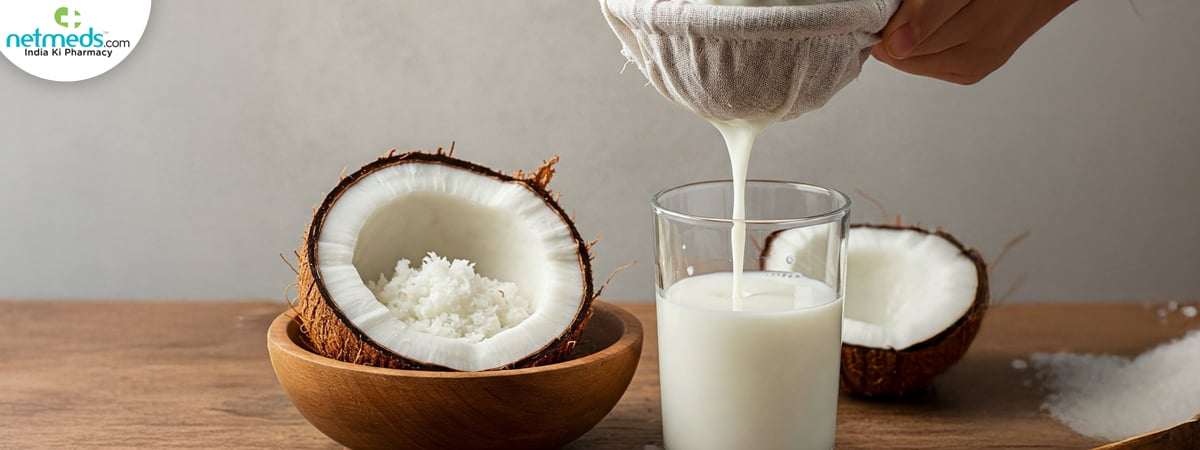The thyroid gland is a vital organ that plays a key role in carrying out several important metabolic functions. This butterfly-shaped organ is situated at the base of the neck. The thyroid gland is involved in several vital functions of the body, including smooth digestion, weight management, proper heart rhythm and cardiovascular function, to name a few.

To Manage Thyroid Functions And Improve Overall Health, Shop From Our Wide Range Of Supplements
And when it comes to maintaining thyroid health, there is a rich array of natural foods that support overall wellness. And one such power food that offers several health benefits and even helps deal with thyroid problems is coconut. Yes, coconut and its by-products have found their way into the limelight owing to their dense nutritional profile and potent therapeutic traits. From coconut water to oil, coconut flesh and milk, every single edible part of this tropical fruit offers incredible benefits. Even chewing the white flesh, also known as coconut meat, can help with thyroid health.
Take this two-minute read to know more about how coconut meat helps to improve thyroid gland function, ways to add it to your diet and side effects.
How Does Coconut Meat Affect Thyroid Function?
The thyroid gland plays a critical role in regulating your metabolism, energy, and hormone balance. Coconut, particularly its flesh and oil, loaded with medium-chain triglycerides (MCTs), is a type of healthy fatty acid that is easily absorbed and used by the body for energy production.
Also Read: Coconut Meat: Nutrition, Uses For Skin, Health Benefits, Side Effects, And Recipe
Evidence has revealed that MCTs can help boost metabolism and energy levels, which may be beneficial for people with an underactive thyroid or hypothyroidism. Besides these, the potent antioxidant and anti-inflammatory qualities of coconut can help lower oxidative stress, which often affects proper thyroid function.
While coconut can support healthy thyroid function, it is not a remedy to treat thyroid disorders. This works best as part of a wholesome diet along with medical treatment and a healthy lifestyle.
Health Benefits of Coconut Flesh
Promotes Metabolic Function
Coconut flesh contains ample reserves of MCT oils that offer an instant source of energy that helps trigger metabolism. This can counteract fatigue, a common symptom associated with hypothyroidism. Thus, regularly drinking 2-3 tablespoons of coconut milk or chewing a few pieces of coconut meat helps to improve thyroid function.
Balances Hormones
Healthy fats are vital for producing hormones like estrogen, cortisol, including thyroid hormones and maintaining hormonal balance. Moderate intake of coconut meat or coconut milk regularly can help maintain hormonal balance and promote thyroid gland function.
Also Read: Thyroid Disorders: Debunking Myths Backed By Science
Fights Inflammation
Coconut flesh contains vast reserves of antioxidants that protect thyroid tissue from inflammation and oxidative damage caused by free radicals.
Digestive Health
Coconut meat is an abundant source of dietary fiber that aids digestion and supports gut health. A healthy gut microbiome indirectly improves thyroid function and hormone regulation.
Boosts Immunity
Coconut is loaded with ample reserves of lauric acid, known for its powerful antimicrobial qualities, supporting the immune system. This is specifically helpful if thyroid issues are linked to autoimmune conditions like Hashimoto’s disease.
Ways to Add Coconut Flesh to Your Diet
Eat raw fresh coconut pieces as a hydrating and satisfying snack.
Blend coconut flesh with banana, spinach, and almonds for a nutrient-packed drink.
Grated coconut adds rich flavour, texture, and nutrition to many Indian and Southeast Asian dishes.
Blend coconut meat with warm water, strain, and use it in soups, gravies or smoothies.
Try adding it to puddings, granola bars, or yogurt bowls for a sweet, rich, nutty twist.
Possible Side Effects
Coconut flesh is healthy and safe when taken in moderate amounts.
As it is high in saturated fat, excess intake can raise cholesterol in some people, so maintain portion size.
Coconut is energy-dense; overconsumption may contribute to weight gain.
Though rare, coconut allergies do occur. Stop using it if you experience itching, swelling, or digestive discomfort.
For people with hyperthyroidism (overactive thyroid), an excess intake of fat, even healthy fat, may overstimulate metabolism, so consumption should be limited and guided by a healthcare provider.
Conclusion
Coconut flesh serves as a great addition to a thyroid-friendly diet regimen when consumed mindfully. It delivers energy, supports metabolism, and nourishes the body with healthy fats and antioxidants. However, it’s not a one-stop solution; go for it as a complementary remedy for better thyroid function and wellness rather than a cure.
(This article is reviewed by Kalyani Krishna, Chief Content Editor)
Author Profile:
M Sowmya Binu
With over 15 years of expertise and a Postgraduate degree in Nutrition, M Sowmya Binu is a seasoned professional in the field of nutrition. Specialising in tailoring personalised diet plans, she underscores the significance of a balanced approach to health, emphasising the integration of medication with dietary intake for holistic wellness. Passionate about equipping individuals with knowledge to make informed decisions, Sowmya adeptly develops insightful content encompassing a wide array of topics, including food, nutrition, supplements, and overall health.
References:
https://pmc.ncbi.nlm.nih.gov/articles/PMC9101513/
Nutritional Management of Thyroiditis of Hashimoto
Yana Danailova 1,†, Tsvetelina Velikova 2,*,†, Georgi Nikolaev 3, Zorka Mitova 4, Alexander Shinkov 5, Hristo Gagov 1, Rossitza Konakchieva 3
Editors: Gabor J Szebeni, László G Puskás
https://www.sciencedirect.com/science/article/abs/pii/S187140212100062X
Health effects of coconut oil: Summary of evidence from systematic reviews and meta-analysis of interventional studies
Author links open overlay panel Ranil Jayawardena a b
, Hasinthi Swarnamali c
, Priyanga Ranasinghe d, Anoop Misra e



 Previous
Previous